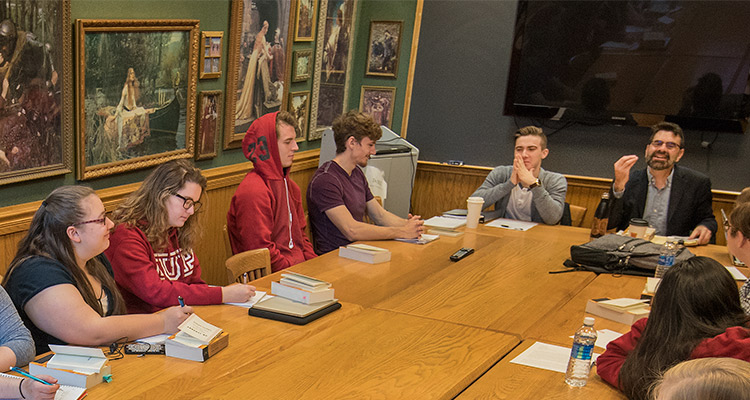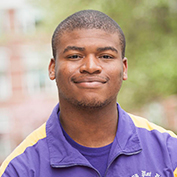
Share Your Insights, Sharpen Your Thinking with the Great Questions
You may have had Advanced Placement (AP), college-in-high-school, dual enrollment, or high school honors classes, but you've never experienced anything like the Cook Honors College Core Curriculum.
Prepare yourself for the excitement of thinking differently about yourself and the world—probing, questioning, debating, and discovering. You'll test old theories and explore new ideas.
The honors core curriculum is based on a series of "Great Questions" that humans have wrestled with from the dawn of time, from Plato to Susan Sontag, from Martin Luther to Dr. Martin Luther King, Jr. This is a program for the intellectually curious. Some of our core questions include:
- What is the difference between belief and knowledge?
- How do we create and use the past?
- How do we discern the good from the bad?
- What does it mean to be human?
- How do we understand the sacred?
Each question we explore is followed by the same, final question: What, therefore, should we do? It's not just about ideas—it's about transforming ideas into purposeful action. Many of our students have been inspired to support a new cause or start a service project to help others in response to their core class experience.
Creating a Safe Space for All Voices
When a learning community values all perspectives, you can safely explore issues, share concerns, and perhaps find common ground with your peers. Will we all believe the same thing? No. Reaching a consensus is not the goal. But we can respect and work to understand each other, while challenging bias and unsupported claims.
In the Cook Honors College you will develop the habit of mind to think critically. But this takes trust and community to develop. You will find both in abundance here.
Honors Core Classes Replace General Requirements
As a CHC student, your honors core classes will replace several of the liberal studies classes required of all students. We designed Core this way so you can benefit from student-centered, writing and discussion based honors learning experiences without adding extra time or expense to your degree.
Honors in the Freshman Year
Freshman core is the foundation of the honors experience. This formative, five-credit class meets four days a week. You will be reading for all and writing for most of those days. Freshman core is meant to challenge you and expand your mind through an immersive experience based on some of the core questions.
Freshman core represents about one third of our students' course work during their first year and is taken in the fall and spring semesters. This interdisciplinary course combines the study of literature, history, philosophy, religious studies, geography, sociology, and the fine arts with emphasis on values inquiry and the skills of critical and synthetic thinking, writing, and problem solving. A team of experienced honors faculty will guide you.
The fine arts component of the honors core course will bring directors, musicians, artists, and writers into your classroom for pre-performance talks. You'll find the fine arts here are not just icing on the cake, but are integral to finding meaningful answers to the core questions.
-
Unit A: What is the difference between belief and knowledge?
-
Unit B: How do we discern the good from the bad?
-
Unit C: How do we understand art?
-
Unit D: How do we create and use the past?
Each question is followed by a final one: What, therefore, should we do?
You will be reading and questioning primary sources: Plato, Machiavelli, Aristotle, Martin Luther King, Virginia Woolf, Chaucer, and others...discussing and debating them freely with the faculty and with each other.
The questions we explore are ones no one can answer for you. A scientist will answer some of these questions differently than an artist, a business executive differently than a philosopher, but all should be able to articulate, explain, and support their positions. We teach you how to do this skillfully and give you lots of opportunities to practice it in your core classes.
Whatever your skill upon entering, you will emerge from the freshman year a greatly improved writer and speaker, able to confidently handle future challenges. Your improved communication skills and ability to solve problems as part of a team will prepare you for the toughest advanced classes or internships.
Honors in the Sophomore Year
The core course and your honors experience don't end after the first year. We think it's a real advantage of our program that it continues for three years and is followed with experiential learning, such as an internship.
In the spring semester of your sophomore year, you will take the "science core," which combines the study of social and natural sciences, including biology, psychology, chemistry, and anthropology. You will draw upon the critical and synthetic thinking skills from the first year to contemplate and analyze two more core questions:
-
Unit E: Why does science matter?
-
Unit F: What does it mean to be human?
And, once again, those questions will be followed with: What, therefore, should we do?
You might elect to add some other sophomore-level university honors classes to your schedule such as Composition II, Educational Psychology, and Probability and Statistics, perhaps in the fall semester.
While most students take the science core in their sophomore year, it is possible to take it in the spring semester of your junior year if needed.
Honors in the Junior Year
You'll revisit the humanities and social sciences in the fall of your junior year to answer two final honors core class questions:
-
Unit G: How do we understand the sacred?
-
Unit H: Must the need for social order conflict with the need for individual liberty?
These questions follow with: What, therefore, should we do?
You'll also become more involved in advanced coursework in your major. Some departments offer honors courses and programs. This is a great time to start thinking about writing an undergraduate thesis or planning a senior project.
This is also a great time to do an internship or study abroad for a semester or a whole year. Because we believe that these external experiences are so vital to your education, we allow the junior core sequence to be flexible. If you want to study abroad or intern during your junior year, you can postpone junior core until your senior year.
Honors in the Senior Year
Seniors who have for whatever reason missed one of the previous core classes can take any of the four Honors Core courses during their final year. Otherwise, we leave the senior year open as students begin to apply for jobs, apply for admission to graduate schools, and finish up the coursework for their majors.
